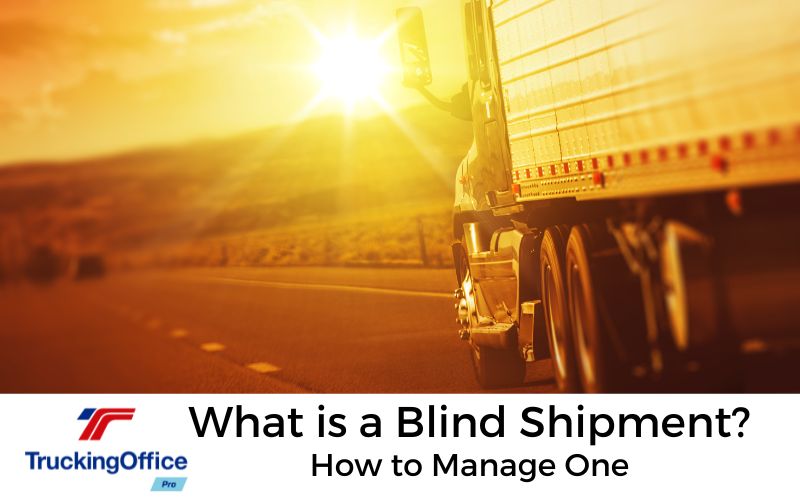What Is a blind shipment? Is it different from a drop shipment? How does an owner operator trucker to handle one?
A bill of lading lists the shipper, the address where the load was picked up, and the receiver, including the delivery address. Seems pretty straightforward. Except when the shipper wants the load picked up from another location and delivered without the receiver knowing. Sounds shady, hunh? But in fact, blind shipments happen regularly. Amazon handles millions of them every day. A blind shipment in a business to business (B2B) setting may be less common, but it’s still an important part of the trucking industry. It’s important for truckers to understand how the blind shipment works and how to do it correctly.
Blind Shipments
Let’s say that Business A has a contract with Business B to provide a product. But Business A doesn’t manufacture that product. Instead, they’re really a middleman between Business B and Business C.
But when a trucker is hired to pick up a load, they may not know that this is a blind shipment.
The first clue will be that the pick up location isn’t on the bill of lading (BOL). Instead, a trucker’s BOL will say an entirely different location.
That may sound a little suspicious, right? But it’s entirely legal because there will be two BOLs. One is for the shipper, showing the pick-up location and the delivery address. Another BOL is for the receiver, which says that the pick-up location is the shipper’s location.
Confused?
Let’s put some names and locations to make this clearer, shall we?*
Spacey Sprockets of Boston has told Cogsey Cogs if Seattle that they have a widget that Cogsey needs. However, Spacey Sprockets doesn’t make the widget. George Widgets of Chicago does. So Spacey Sprockets orders the widgets, but shipping the widgets to Spacey Sprocket wastes time and money, since all they would do is ship them out immediately to Cogsey.
So Spacey Sprockets orders the widgets to be shipped directly to Cogsey. But Spacey Sprockets doesn’t want to lose that middleman money, so they want the paperwork to show their name only.
Don’t Mess Up the BOL
The job of the trucker sounds simple:
- to pick up the load on time,
- deliver the load on time,
- take care of the paperwork.
Yes, that’s a gross understatement of what the job of a trucker is. But that last one – that’s where the blind shipment can go wrong.
A trucker may have to create a BOL for some loads. (TruckingOffice PRO does have a BOL generator for truckers who need it.) For a blind shipment, it’s really best if the BOL is provided by the shipper. That way, any problems with the paperwork are on the people who prepared it, not on the trucker.
No, the trucker has a different problem.
Make sure you give the receiver the correct BOL.
Whether a BOL is electronic or paper, the receiver must see the right BOL. If Cogsey finds out about George Widgets through the BOL, Spacey Sprockets will lose the contract.
That’s not a place a trucker wants to be. It could lead to legal action.
However you manage it, keep the two BOLs separate.
Billing the Blind Shipment
Know who you’re supposed to send your invoice to. Sending the invoice to the address where the load was picked up won’t get paid. If the load is brokered, take time to check with the broker to be sure of the billing address.
Send copies of both BOLs to the billing department. Don’t give them a reason not to pay the invoice by sending only one.
The Other Blind Shipment?
There is another common use of the term “blind” in trucking. Blind deliveries are rare shipments when the trucker doesn’t know the delivery location when they pick up the load. Back in the day before GPS, getting a load without a delivery address was asking for trouble. Delivering a load without a clear delivery location – especially if there’s a specific window or scheduled delivery time – can be nerve-wracking. Now that GPS can pinpoint a location with ease, a blind delivery is less difficult to handle, but it’s still unusual.
Drop Shipments
In many ways, blind and drop shipments are the same. The term “drop shipments” is commonly used in the retail or e-commerce world. Amazon has thousands of retailers who post products on the Amazon site. When the product is shipped, it’s sometimes “Amazon” on the shipping documents because the retailer wants to keep their name out of the process. Amazon isn’t the only online retailer that handles drop shipments.
Have you ever handled a blind shipment? How did you manage the paperwork to keep it in order?
*Thanks to Hanna Barbera for inspiring the names.







I picked up a blind load. Address did not exist and no one was there to pick it up. Broker does not answer phone or texts. That was Thursday and today is Monday.
What do I do with the load. I need my trailer to work.